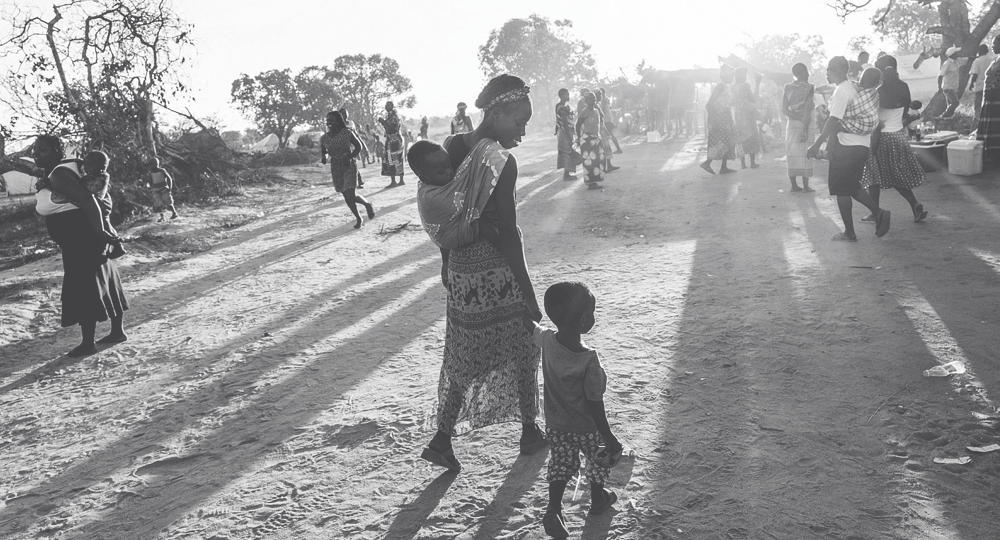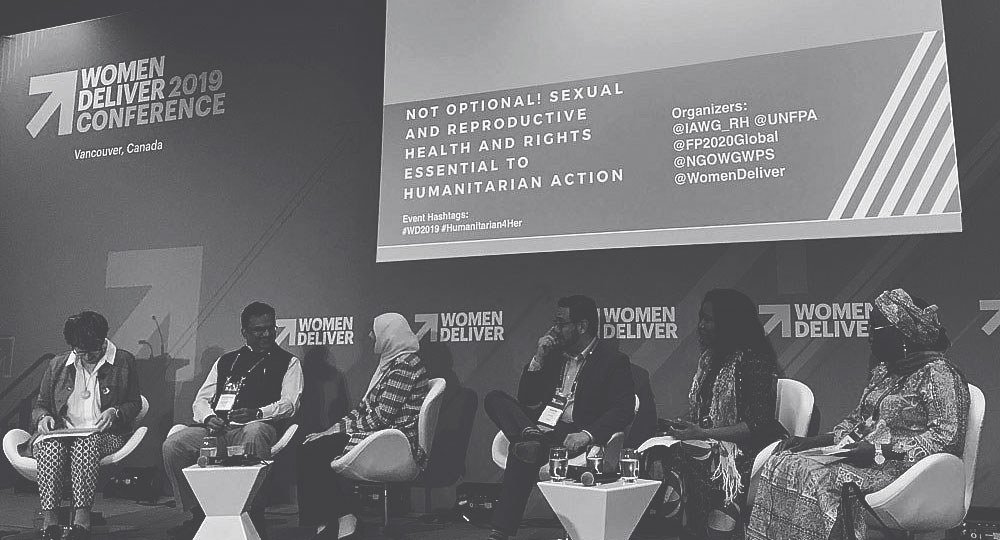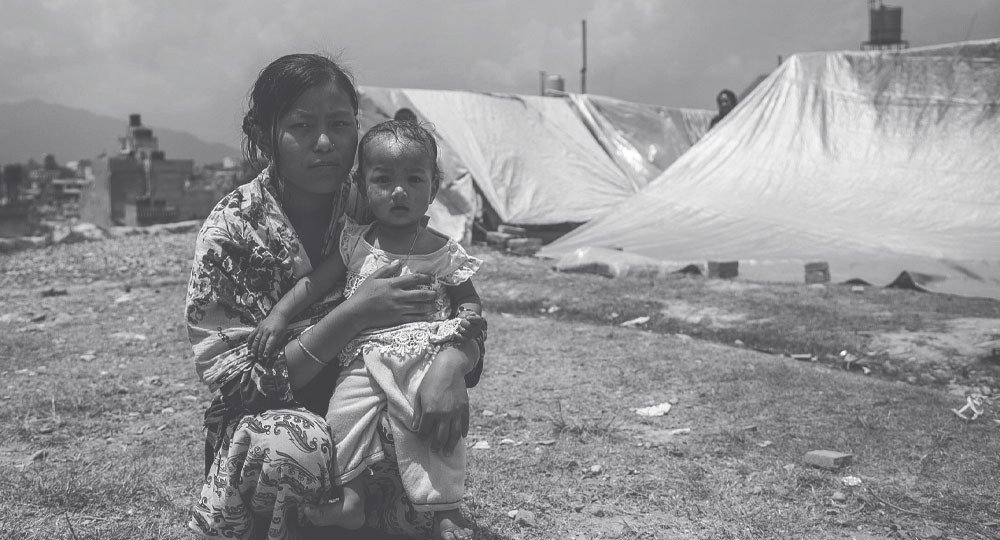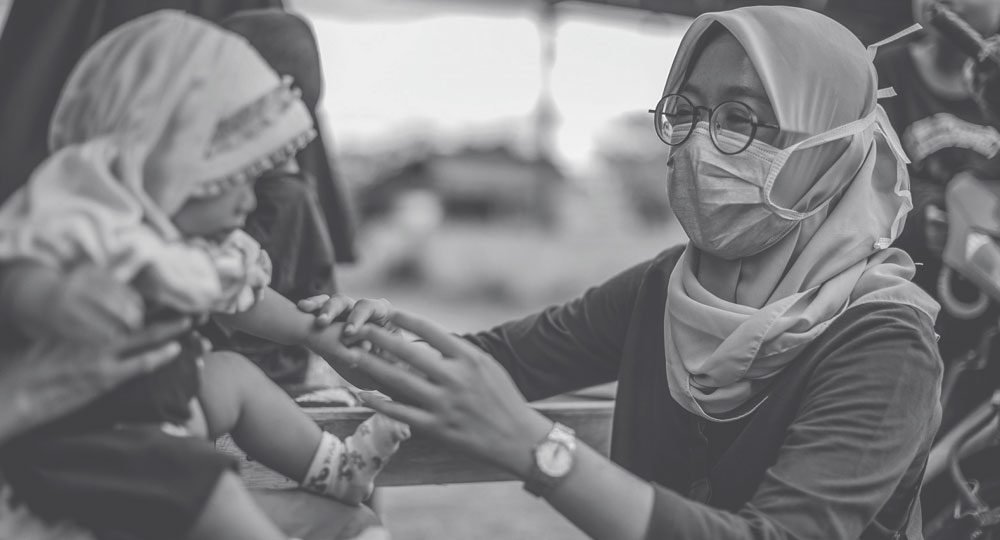
Launch of tools to support uptake of the 2018 Inter-Agency Field Manual for Reproductive Health in Humanitarian Settings
Online Platform for the Inter-Agency Field Manual for Reproductive Health in Humanitarian Settings
The new Inter-Agency Field Manual (Field Manual) microsite, launched in September 2019, offers an advanced digital version of the Field Manual, taking into special consideration the needs of frontline implementers. Key features include reactive loading to improve speed in low connectivity areas, links to related content throughout the manual to better highlight interlinkages among topics, a robust search feature, and hover expansion of acronyms and abbreviations. The site also features an easily searchable compilation of case studies as well as a reference and resource section that will be updated regularly. The online platform will be available in French, Arabic, and Spanish in 2020. IAWGfieldmanual.com/
Minimum Initial Service Package (MISP) for Sexual and Reproductive Health (SRH): A Distance Learning Module
In December 2019, the Women’s Refugee Commission and IAWG released the revised Minimum Initial Service Package (MISP) for Sexual and Reproductive Health (SRH): A Distance Learning Module. This self-instructional module increases humanitarian actors’ and partners’ knowledge of the priority, lifesaving SRH services in emergency settings. Based on the 2018 revision of the IAWG’s Inter-Agency Field Manual on Reproductive Health in Humanitarian Settings, “Chapter 3: Minimum Initial Service Package”, it contains nine units, quizzes, and eight new eLearning activities for learners to interactively engage with the material. It is freely available online on the IAWG website and can also be downloaded for offline use. The module will be available in French, Arabic, and Spanish in 2020. https://iawg.net/misp/dlm
The Minimum Initial Services Package (MISP) for Sexual and Reproductive Health (SRH) in Humanitarian Settings Calculator
Updated in 2019, this tool calculates the reproductive health statistics necessary for implementing the MISP, designed to help coordinators and program managers determine affected population demographics for advocacy, fundraising, and programming. Users can input affected population numbers, when known, and the tool provides immediate access to the best available data for populations in the affected country and/or subnational area. The most significant change to the calculator is the addition of country-specific default data, when available (in addition to the global default data). iawg.net/misp-calculator

Women Deliver
In June 2019, more than 8,000 people from over 165 countries gathered in Vancouver, Canada for Women Deliver, the world’s largest conference on gender equality and the health, rights, and wellbeing of girls and women.
What we did
IAWG was invited to co-curate the humanitarian segment of the conference and developed four panels, which all included representatives from community-based and national organization from conflict-affected or fragile settings. These panels included:
- Surviving Day One: Birth in the Humanitarian-Development Nexus
- Designing Emergency Response with the Adolescent Girl in Mind
- A Humanitarian System by Women, for Women: The Essential Role of Women-Focused CSOs
- Not Optional! Sexual and Reproductive Health and Rights Essential to Humanitarian Action
The IAWG Advocacy and Accountability sub-working group and the Communications task team disseminated a curated a list of humanitarian-focused sessions along with advocacy messages, which were printed on postcards and disseminated widely at IAWG panels and member-agency booths in the exhibit hall.
The 2019 conference featured a much larger humanitarian focus than in years past, with calls for a more feminist and localized approach to humanitarian aid. IAWG’s collective effort before the conference informed the program and during the conference added to joint advocacy, ultimately helping to ensure that women and girls in humanitarian settings were represented at this powerful global convening and their voices reflected in resulting policies, programming, and commitments.

The Nairobi Summit
2019 marked the 25th anniversary of the International Conference on Population and Development (ICPD) in Cairo, where refugee and displaced persons including adolescent’s rights to sexual and reproductive health were first explicitly recognized in the 1994 Programme of Action. From 12-14 November, the governments of Kenya and Denmark and UNFPA co-convened the Nairobi Summit on ICPD25. This “high-level conference to mobilize the political will and financial commitments needed to fully implement the ICPD Programme of Action” included reinforcing the importance of achieving zero unmet need for family planning information and services, zero preventable maternal deaths, and zero sexual and gender-based violence and harmful practices against women and girls. One of the five themes of the Summit was Upholding the right to sexual and reproductive health care even in humanitarian and fragile contexts.
What we did
IAWG engaged in extensive advocacy and planning leading up to the Nairobi Summit to ensure strong commitments for SRHR in humanitarian settings. A panel co-convened by Women Deliver, FP2020, and IAWG on delivering the MISP for SRH in emergencies was accepted, offering a prominent and broad platform to present the 2018 revised MISP. The IAWG communications task team curated a list of humanitarian sessions, which was shared through our listserv of close to 3,000 recipients, and worked closely with the Advocacy and Accountability sub-working group to develop an infographic on IAWG’s major accomplishments over the last 25 years, which was disseminated widely online and to conference participants. We hope that commitments from the Summit translate to increased funding and policy support for SRHR in humanitarian and fragile settings.

Institutionalizing high-quality adolescent sexual and reproductive health (ASRH) programming in humanitarian settings
With support from the Netherlands Ministry of Foreign Affairs, IAWG has engaged an inter-agency adolescent sexual and reproductive health (ASRH) specialist based at Save the Children to lead our work to institutionalize ASRH in humanitarian settings and improve adolescents’ access to services.
In 2019, the IAWG ASRH specialist in collaboration with the ASRH sub-working group led two regional training of trainer (ToT) workshops on ASRH in Emergencies. The first workshop, held in the Middle East and North Africa (MENA) region, brought together 12 participants from five countries. A second ToT was held in Bogota, Colombia. While the focus was mainly on the Venezuelan crisis, SRH managers from across the Latin American and Caribbean (LAC) region were invited to participate. There were 18 participants total.
Follow-up with previous ToT participants in Cox’s Bazar (2018), Amman (2019), and Bogota (2019) showed that workshop participants are continuing to advance ASRH in their regions, with ongoing remote technical assistance from the IAWG ASRH specialist.
Examples include:
Cox’s Bazar
- An ASRH Taskforce was established after the workshop. The Taskforce met regularly, providing presentations to the SRH sub-cluster, and planning ASRH assessments and further trainings.
- Participants undertook activities including ASRH assessments, mobilizing resources for ASRH, developing adolescent strategies for their organizations, and implementing new ASRH programming.
- Seven participants have further trained 203 staff members on health teams and other sectors including protection, mental health, and psychosocial support.
MENA Region
- Participants undertook ASRH activities, including holding awareness raising sessions, mapping ASRH programming in humanitarian settings in the region, and integrating ASRH into other sectors of their work.
- Participants have advocated for inclusion of ASRH in programming when partnering with other agencies and have provided ASRH input into proposals.
- Six participants have further trained 81 staff members within their health teams or in other sectors, with additional trainings planned in 2020.
LAC Region
- Participants implemented ASRH activities including revising materials and guidance to include ASRH, initiating/training staff on MISP activities for adolescents and young people, conducting focus group discussions with adolescents, integrating SRH into education programs, and supporting partners to provide contraception, education, abortion, and
- GBV services and information to young people.
- Six trainings have been conducted by participants to train an additional 114 people, with plans for further cascade trainings in 2020.

Training Partnership Initiative
New training materials for crisis-affected settings: long-acting reversible contraceptive methods and uterine evacuation with medications
The IAWG Training Partnership Initiative (TPI) and its partners have developed a series of training materials called the SRH Clinical Outreach Refresher Trainings (S-CORTs). These trainings are designed to rapidly update and reinforce clinical service providers’ knowledge and skills on several of the lifesaving SRH services included in the MISP. They are intended for use in humanitarian contexts during the emergency phase once the situation allows, or as part of preparedness or recovery efforts.
With funding from the Ministry of Foreign Affairs of the Netherlands, the IAWG-TPI partnered with CARE to develop a three-day S-CORT module focused on long-acting reversible contraceptive (LARC) methods. The training is complementary to CARE’s existing comprehensive family planning counseling training package. The module was piloted in Kathmandu, Nepal; Goma, DRC; and Cox’s Bazar, Bangladesh.
Further, the IAWG-TPI continued its collaboration with Ipas to develop a training on uterine evacuation using medications. These materials are designed to be used for a standalone training or combined with the available S-CORT on manual vacuum aspiration. In 2019, the uterine evacuation module was piloted in Yumbe, Uganda and Maiduguri, Nigeria. A third training was held in Goma, DRC with materials that were adapted to comply with the United States’ PLGHA policy. These two new resources offer another tool and approach to maximize the capacity of clinical service providers to deliver the high quality, respectful, lifesaving clinical interventions included in the MISP.
Planning for comprehensive SRH services as part of the MISP
The IAWG-TPI continued its strong collaboration with the WHO/Global Health Cluster to pilot a toolkit to support colleagues with the MISP objective to: “plan for SRH services integrated into primary health care as soon as possible, and work with the health sector/cluster partners to address the six health system building blocks.” The toolkit guides SRH and health coordinators through facilitating a workshop that engages national stakeholders and partners in a participatory planning process. As a result, participants create a collective workplan for how to improve the quality of MISP services and integrate comprehensive SRH services into health system strengthening efforts at the national or local level.
In 2019, the WHO/Global Health Cluster and IAWG-TPI held two workshops in Yemen. In addition, as follow-up to an August 2018 planning workshop for the Democratic Republic of Congo’s Kasai region, the TPI provided seed funding for activities from the collective workplan, including integrating the MISP into the revised national midwifery curriculum and updating skills labs, classrooms, and in-service training sites to accommodate the revised curriculum’s competency-based training methodology. Following the November 2018 Bangladesh workshop, seed funding was provided to strengthen community health workers’ capacity, and referral systems for obstetric and other sexual reproductive health emergencies from the camps to higher-level clinical care centers in Cox’s Bazar.